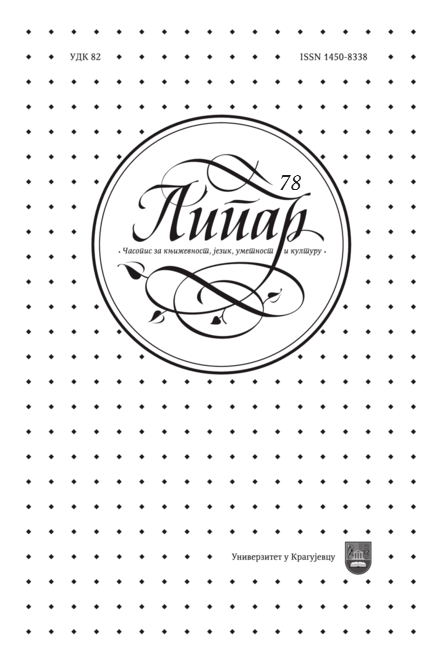ПАРАДОКСИ КЊИЖЕВНЕ НАЦИОНАЛНОСТИ: СЛУЧАЈ БРАЋЕ ДИЗДАР
PARADOXES OF LITERARY NATIONALITY: THE CASE OF THE DIZDAR BROTHERS
Author(s): Vesna TrijićSubject(s): Language and Literature Studies, Studies of Literature, Croatian Literature, Serbian Literature, Social Theory, Sociology of Culture, Sociology of Politics
Published by: Универзитет у Крагујевцу
Keywords: literary nationality; Serbian literary history; Serbian retrospective bibliography; cultural politics; national identity; biliterariness
Summary/Abstract: This paper defines the term of literary nationality and explains its function in Serbian literary history and bibliography. It presents challenges in its application on the examples of literary and journalistic works of Hamid and Mak Dizdar, born brothers, of whom the first one was known as Serbian and the second one as Croatian author. Our research has shown that Hamid Dizdar started his literary and journalistic career as an author of Serbian nationality: he wrote in Serbian language, worked in papers with strong pro-Serbian political orientation and even entered polemics due to such choices. However, during World War II, when Sarajevo became an important center of the Independent State of Croatia, he declared himself as Croatian writer of Muslim religion and took part in fascist propaganda. There are also a few testimonies of his cooperation with both partisans and chetniks. In communist Yugoslavia, he declared himself as Serbian once more and was entrusted important task of running the newly established Historical archive in Sarajevo. His archival works inclined to Bosnian integralism. In the case of Mak Dizdar, works from the last five years of his life, from the book of poetry Stone Sleeper to the controversial “Marginalia about and around the language“, have been singled out as crucial in defining his literary nationality. It has been shown that only after the essay of Muhamed Filipović “Bosnian spirit in literature, what is that?“, in which Stone Sleeper was attributed as a milestone in the awakening of “Bosnian consciousness“, political views of Mak Dizdar had been radicalized, but only in his public engagement, not in his literary works. The outcome of this research is awareness that the Yugoslav period can be adequately described in national literary histories and bibliographies only by applying the term of literary nationality.
Journal: Липар - часопис за књижевност, језик, уметност и културу
- Issue Year: XXIII/2022
- Issue No: 78
- Page Range: 45-61
- Page Count: 17
- Language: Serbian

